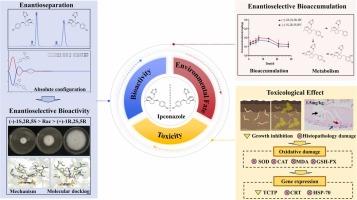当前位置:
X-MOL 学术
›
J. Hazard. Mater.
›
论文详情
Our official English website, www.x-mol.net, welcomes your
feedback! (Note: you will need to create a separate account there.)
Enantioseparation, bioactivity, environmental fate and toxicity of chiral triazole fungicide ipconazole in soil and earthworm
Journal of Hazardous Materials ( IF 12.2 ) Pub Date : 2024-12-16 , DOI: 10.1016/j.jhazmat.2024.136921 Jiajia Fan, Pengxi Li, Fanrong Zhao, Li Zheng, Peng Wang, Donghui Liu, Zhiqiang Zhou, Xueke Liu
Journal of Hazardous Materials ( IF 12.2 ) Pub Date : 2024-12-16 , DOI: 10.1016/j.jhazmat.2024.136921 Jiajia Fan, Pengxi Li, Fanrong Zhao, Li Zheng, Peng Wang, Donghui Liu, Zhiqiang Zhou, Xueke Liu

|
Ipconazole (IPC) is a chiral triazole fungicide and commonly used for disease control in seeds. This study investigated the bioactivity and potential mechanism of ipconazole against pathogenic microorganisms at the chiral perspective. It explored the accumulation behavior of ipconazole enantiomers within the soil-earthworm system and evaluated its toxic effects on earthworms. Bioactivity evaluation revealed that the bioactivity order of ipconazole against three plant pathogens is (−)-1S,2 R,5S-IPC > rac-IPC > (+)-1R,2S,5R-IPC, and the bioactivity of (−)-1S,2 R,5S-IPC is 34.6–129.5 times higher than that of (+)-1R,2S,5R-IPC. Molecular docking found that (−)-1S,2 R,5S-IPC has a stronger binding affinity for the target protein CYP51 to cause activity differences. Accumulation and metabolism studies revealed that (−)-1S,2 R,5S-IPC is more persistent than that of (+)-1R,2S,5R-IPC, and ipconazole was primarily metabolized into hydroxylated ipconazole through hydroxylation in the soil-earthworm system. Toxicological evaluation found growth inhibitory effects and histopathological damage to earthworms at an exposure concentration of 1.5 mg kg−1 ipconazole. Further investigation indicated that these toxic effects of ipconazole were caused by inducing oxidative damage and influencing the functional gene expression of related growth. These research findings will further enhance the understanding of the activity and risks of ipconazole enantiomers, contributing to the safer use of ipconazole in the agricultural environment.
中文翻译:

手性三唑类杀菌剂异康唑在土壤和蚯蚓中的对映体分离、生物活性、环境归宿和毒性
Ipconazole (IPC) 是一种手性三唑类杀菌剂,常用于种子中的病害控制。本研究从手性角度探讨了易环康唑对病原微生物的生物活性和潜在机制。它探讨了易康唑对映异构体在土壤-蚯蚓系统中的积累行为,并评估了其对蚯蚓的毒性作用。生物活性评价显示,易康唑对三种植物病原菌的生物活性顺序为 (−)-1S,2R,5S-IPC > rac-IPC > (+)-1R,2S,5R-IPC,(−)-1S,2R,5S-IPC 的生物活性是 (+)-1R,2S,5R-IPC 的 34.6-129.5 倍。分子对接发现 (−)-1S,2R,5S-IPC 对目标蛋白 CYP51 具有更强的结合亲和力,可引起活性差异。积累和代谢研究表明,(−)-1S,2R,5S-IPC 比 (+)-1R,2S,5R-IPC 更持久,易环康唑在土壤-蚯蚓系统中主要通过羟基化代谢成羟基化的易康唑。毒理学评价发现,暴露浓度为 1.5mgkg-1 ipconazole 对蚯蚓有生长抑制作用和组织病理学损伤。进一步的研究表明,易康唑的这些毒性作用是通过诱导氧化损伤和影响相关生长的功能基因表达引起的。这些研究结果将进一步增强对 ipconazole 对映异构体活性和风险的理解,有助于在农业环境中更安全地使用 ipconazole。
更新日期:2024-12-21
中文翻译:

手性三唑类杀菌剂异康唑在土壤和蚯蚓中的对映体分离、生物活性、环境归宿和毒性
Ipconazole (IPC) 是一种手性三唑类杀菌剂,常用于种子中的病害控制。本研究从手性角度探讨了易环康唑对病原微生物的生物活性和潜在机制。它探讨了易康唑对映异构体在土壤-蚯蚓系统中的积累行为,并评估了其对蚯蚓的毒性作用。生物活性评价显示,易康唑对三种植物病原菌的生物活性顺序为 (−)-1S,2R,5S-IPC > rac-IPC > (+)-1R,2S,5R-IPC,(−)-1S,2R,5S-IPC 的生物活性是 (+)-1R,2S,5R-IPC 的 34.6-129.5 倍。分子对接发现 (−)-1S,2R,5S-IPC 对目标蛋白 CYP51 具有更强的结合亲和力,可引起活性差异。积累和代谢研究表明,(−)-1S,2R,5S-IPC 比 (+)-1R,2S,5R-IPC 更持久,易环康唑在土壤-蚯蚓系统中主要通过羟基化代谢成羟基化的易康唑。毒理学评价发现,暴露浓度为 1.5mgkg-1 ipconazole 对蚯蚓有生长抑制作用和组织病理学损伤。进一步的研究表明,易康唑的这些毒性作用是通过诱导氧化损伤和影响相关生长的功能基因表达引起的。这些研究结果将进一步增强对 ipconazole 对映异构体活性和风险的理解,有助于在农业环境中更安全地使用 ipconazole。






























 京公网安备 11010802027423号
京公网安备 11010802027423号